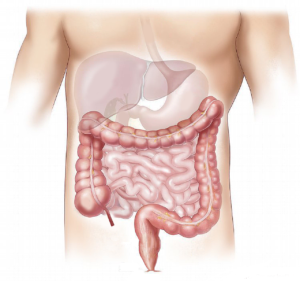Understanding the Connection Between Gut Health and Migraines
This is a guest post by Dr. Brent Wells.
I wanted Dr. Wells to write on migraines and the gut because I first hand have seen the connection. I used to get debilitating migraines. My headaches at times were so bad that I literally had to crawl to the bathroom in the dark because it was too painful to walk and obviously I could not handle any light. I kept a huge super saver bottle of Ibuprofen in my purse and popped them like candy daily. In reality, I was making my gut health worse, and my headaches were coming with more frequency and severity. While migraines can be multifactorial with more than one root cause, addressing gut health should not be overlooked.
It is important to note that you have many options to be free of migraine pain and that medications are not your only solution.
Migraine headaches are one of the true banes of modern-day existence. Scientists don’t fully understand them and stopping them has been a very elusive process.
Nausea and vomiting are not uncommon when a severe migraine occurs, and while most people don’t think beyond that, the truth is that there is some connection between overall gut health and migraine headaches.
Could your gut health be affecting your migraines? Could it be making them worse or longer-lasting? Could migraines actually start in our bellies, not in our heads?
Let’s talk about what we know regarding the connection between migraines and your digestive system.
The Human Gut
The typical gut of the average human contains slightly more than 2 pounds of microbes. This includes protists, fungi, bacteria, and even viruses. The combination of these microbes is often called the gut microbiome.
Scientists have linked gut microbiome to a wide range of problems, including Parkinson’s, Alzheimer’s, MS, anxiety, and depression. One study has found that there was also an extraordinarily strong correlation between migraines and the type of microbes found in the digestive system.
We know that the digestive system, the intestines, in particular, are in constant communication with our brains, but how that communication occurs is still in dispute.
Some experts believe that the microbiome makes its own neurotransmitters that are sent via the blood to the brain. Other experts think that the Vagus nerve plays a role in changing the brain receptors.
One way or another, the microbiome is communicating with the brain.
What We Know About the Connection Between the Gut and the Brain
The idea that certain foods or beverages can trigger a migraine has been around for decades, but there haven’t been any real studies until 2016.
This study found that people who experience migraines have more bacteria in the mouth and the gut that cause the body to create nitric oxide gas. Nitric oxide is known to be a trigger for migraines, and this might explain, at least in part, why some people get migraines and others do not.
In this same study, researchers discovered that heart patients who consume drugs containing nitrates for heart failure or angina, migraine headaches are a common side effect.
Can Probiotics Help?
It appears that they can. While probiotics cannot eliminate migraines, one study published in 2019 found that those who consumed probiotics, mainly bifidobacterium. Bacillus subtilis, and lactobacillus, had a 45 percent reduction in chronic migraines and a 40 percent reduction for those with episodic migraines. Migraine intensity was also reduced by as much as 31 percent.
Leaky Gut Syndrome and the Link to Migraines
Leaky gut syndrome has also been linked to migraine headaches.
With leaky gut syndrome, gaps within the intestinal walls allow toxins and bacteria from the intestines to pass into the bloodstream. This triggers inflammation and can drastically change gut flora.
Common symptoms of leaky gut syndrome include gas, bloating, cramps, body aches, asthma, acne, arthritis, MS, food sensitivities, obesity, and migraines.
Unfortunately, many other types of health issues, such as Crohn’s Disease and Irritable Bowel Syndrome, also have similar symptoms.
Some experts believe that leaky gut syndrome may explain why medications are sometimes ineffective for those with migraines.
https://drive.google.com/file/d/1IL0AL_5-m5AIM_tkNtFQDikGLM-goyV6/view?usp=sharing
A very large part of the body’s immune system lies in the gut, so when the flora of the gut is compromised or isn’t working properly, it can impact how the immune system works.
Inflammation is a natural part of the body’s immune system response, but when inflammation becomes chronic, it leads to another plethora of problems, such as diabetes and arthritis.
It’s clear that doctors and other health specialists need to start treating the whole body, rather than focus on one area.
A Multi-Faceted Approach is Required
Rather than strictly looking at migraines and the head, health care professionals should start a multi-faceted approach towards treating migraines.
This means considering probiotics, dietary changes, natural supplements, IV vitamin therapy, and spinal alignment, rather than simply looking for a pill to stop the pain.
What Other Options Are There?
Unfortunately, for those who don’t suffer from migraines, they believe that getting rid of a migraine is as simple as taking a few over the counter pain medications.
If only it were that simple!
As a chiropractor, I’ve discovered that there are multiple ways to help deal with migraines. Every person is different and will respond to treatments differently, but it is a rare migraine sufferer who doesn’t find at least some relief from the following:
- Dietary Changes– Eating an anti-inflammatory diet can be very helpful for reducing the intensity and frequency of migraines.
- Dietary Supplements- The main focus of supplements should be to control inflammation. A proper omega-3/omega-6 balance is vital and other anti-inflammatories, such as curcumin, can be helpful.
- Probiotics- I believe everyone should consume probiotics. They are natural and help to counteract a poor diet, as well as help with a variety of gut issues. As mentioned above, studies have also found probiotics can reduce migraine frequency and intensity.
- Chiropractic Massage- Massage therapy has a multitude of benefits, but one often overlooked benefit is that it can also reduce the frequency and intensity of migraines.
- Chiropractic Adjustments- Studies in this area have been small but they have shown that chiropractic adjustments work to reduce the frequency of migraines.
The Bottom Line
There needs to be a great deal more work and study in this area, but there is no denying that the gut microbiome is related to our brains and how they function.
Eating a healthy, anti-inflammatory diet and consuming probiotics is one easy and natural way that you can help fight migraine attacks. Always speak to your primary care physician or chiropractor before consuming any supplements, especially if you are taking prescription medications or if you have a medical condition.
Be good to your body and it should last you a lifetime.
About the Author:
Dr. Brent Wells founded Better Health Chiropractic & Physical Rehab in Alaska in 1998. He is a graduate of the University of Nevada where he earned his Bachelor of Science degree before moving on to complete his doctorate from Western States Chiropractic College. The goal for Dr. Wells is to treat Anchorage and Juneau patients through massage therapy, chiropractic care, and physical rehab therapy with care and compassion while providing them with a better quality of life.





Leave A Comment
You must be logged in to post a comment.